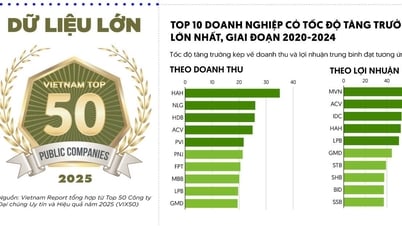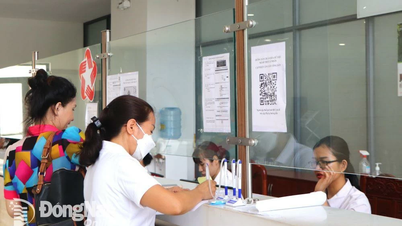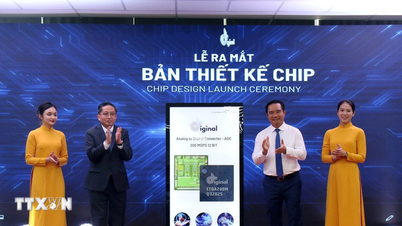BCI Business Confidence Index Q2/2025 at an optimistic level
On June 30, the European Chamber of Commerce in Vietnam (EuroCham) officially released the Business Confidence Index (BCI) for the second quarter of 2025, reflecting a rapidly changing economic picture in which European businesses in Vietnam are still adapting. This quarter's BCI recorded a score of 61.1 - a slight decrease compared to the previous quarter amid increasing global uncertainty. However, the general trend remains controlled optimism.

BCI Business Confidence Index in Vietnam continues to increase after COVID-19. (source: EuroCham)
One of the key tools to help businesses maintain resilience in the complex global trade context is the Certificate of Origin (C/O). From May 5, 2025, the Ministry of Industry and Trade officially took over the C/O issuance process, with the orientation of promoting digital transformation in a number of key stages. This move is highly appreciated by the business community, as it promises to cut administrative procedures, shorten processing time and integrate more effectively with the electronic customs system and digital signature.
The implementation of digitalization of administrative procedures through the VNeID system for enterprises is a positive step towards an effective 'one-stop' model for both investors and the business community. The initial technology transfer phase recorded a number of technical difficulties. For example, for FDI enterprises, foreign legal representatives cannot register for VNeID accounts because there is no suitable mechanism. This reality shows the importance of thorough testing, full consultation with stakeholders and applying a suitable implementation roadmap, especially for nationwide digital systems.
Trump reveals investors want to buy TikTok
Former US President Donald Trump has made headlines after revealing that he is working with a group of potential investors to acquire video- sharing platform TikTok – an app that is facing the risk of being banned in the US due to national security concerns. In an interview with Fox News, Mr. Trump said that more details would be announced within the next two weeks, while expressing optimism that Chinese President Xi Jinping “may agree” to the deal.

TitTok is struggling in the US. (Internet source)
Under a new law passed by the US government, ByteDance – TikTok’s parent company in China – is required to sell the app to a US entity by September 17 or face a complete ban in the market. TikTok is currently challenging the ban in the US Supreme Court but has not been successful, while Mr. Trump himself has previously postponed similar measures three times during his previous term.
It is worth noting that, despite criticizing TikTok for security reasons, Trump has admitted that the app plays a significant role in his 2024 presidential campaign. This development continues to put TikTok at the center of the US-China technology confrontation, while also demonstrating the growing influence of social media platforms on global politics and trade.
Scattered Spider hacker group expands attacks to aviation and transportation industry
The FBI, along with leading cybersecurity companies such as Mandiant (a Google subsidiary) and Unit 42 (Palo Alto Networks), have issued a warning that the notorious Scattered Spider hacker group is expanding its targeting to the aviation and transportation sectors. The group, which is composed mainly of English-speaking teenagers, is known for its sophisticated social engineering tactics, from impersonating IT staff to threatening violence to gain access to corporate systems. They often use techniques such as email phishing, identity spoofing, and ransomware.
The FBI said the latest attacks show that anyone in the airline supply chain — including contractors and outside IT service providers — could be a target. At least two airlines have confirmed they were affected: Hawaiian Airlines is dealing with a recent breach, while Canada’s WestJet is still dealing with an attack that has not been resolved since June 13.
Notably, this is not the first time Scattered Spider has targeted essential industries. Previously, the group made headlines when it attacked hotel chains, casinos, insurance companies, and the retail sector in the UK. The latest wave of attacks shows that cybercriminals are becoming more daring and organized, especially when targeting sectors with complex technical infrastructure and playing an essential role in society.
Helsinki tests AI to prevent tram accidents
The city of Helsinki (Finland) has just deployed a pilot of 40 electric vehicles operated by Tier-Dott, equipped with AI sensors developed by the UK company See.Sense to improve traffic safety. These sensors record data on sudden braking, shaking or sudden changes of direction – warning signs of an accident – and transmit them to an analysis platform built by French startup Vianova.
The project is part of the European Union-funded ELABORATOR program, which aims to help cities proactively identify risk hotspots and improve infrastructure, rather than just reacting to accidents. With electric vehicle-related accidents on the rise in Europe, Helsinki is becoming a notable test case for cities looking to build smarter, more sustainable transport systems.

The spike in tram accidents in Europe has prompted many cities to tighten management. (Source: thenextweb).
Source: https://vtcnews.vn/cong-nghe-30-6-chuyen-doi-so-tai-viet-nam-cung-co-niem-tin-doanh-nghiep-chau-au-ar951775.html
































































































Comment (0)